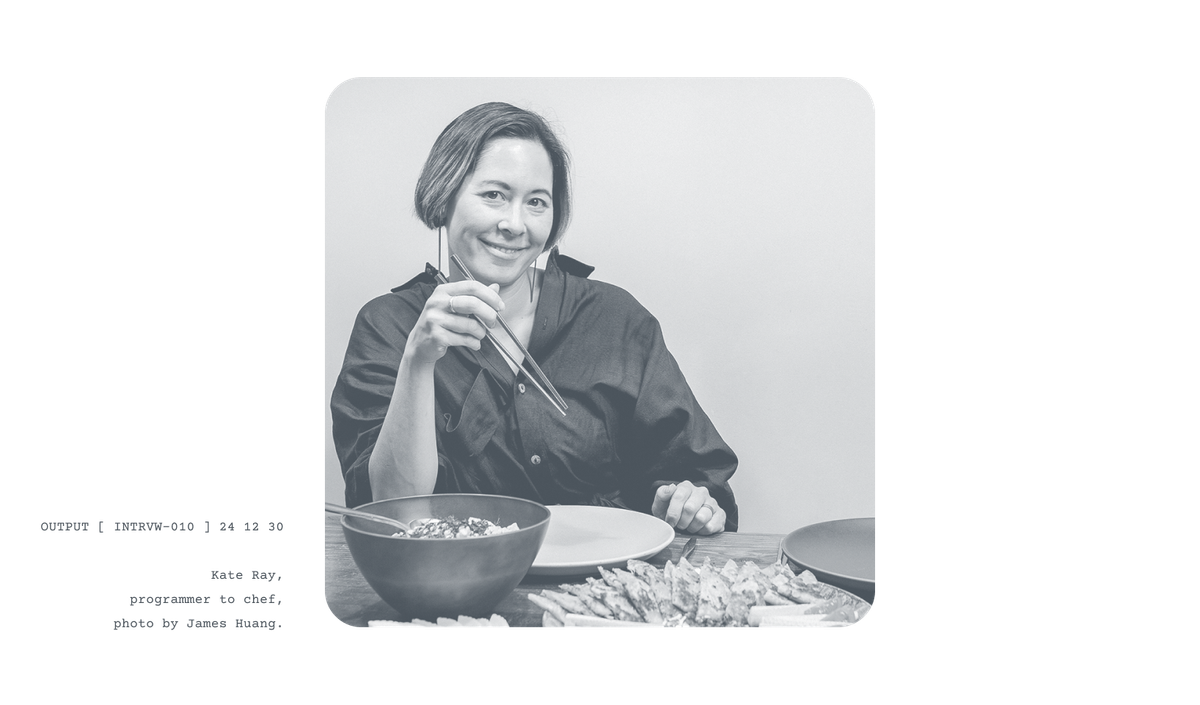Kate Ray, Programmer to Chef

Kate Ray was a computer programmer and creative technologist for more than 10 years before becoming a plant-based (and fungi-based) chef in the Hudson Valley.
APOSSIBLE™ is a non-profit bringing psychologists, technologists, artists and creatives together to explore how technology can better support creativity and human fulfillment. In this ongoing interview series we’re discovering what people value, what makes their lives fulfilling, and what kinds of relationships to technology they already cherish.
1. What is a ritual, practice, or routine in your life that is important for your psychological wellbeing and/or fulfillment? Why?
It’s hard to write morning pages when your toddler wakes you up at 6am crying because his pants are on but also crying because you took them off. The ritual of a nice dinner with your partner becomes superseded by the need to fill the baby with acceptable food so that maybe he can sleep a little longer the next morning. I would say that the ritual most present in my life these days is the continual reminder that there is nothing that is not ritual. I peel an apple and practice the ritual of apple-peeling. I stack the dishes in the sink and wipe the crumbs off the kitchen table into my hand and the clean table is my object of reverence. There are ways — practices and luxuries — that I still use to get away from my life sometimes, but since I’m mostly stuck in the thick of it, I remind myself that ordinary life fits the absolute as a box and its lid and I ritualize the walking, the breathing, the continuance.
2. What is a human-made creation that brings out the best in you? Why?
There is a small park near my old apartment in Brooklyn that, during the first Covid summer, became my auxiliary living room as well as that of everyone in the neighborhood. I went out there to watch people knitting, meditating, birdwatching, napping, practicing violin, serving dinner with tablecloths and flowers, getting married, having fights, going on dates, and raising children in the 1x2-block rectangle of greenery. There was fear of dying during that time, but the truth is I’d never seen so much living up close. Every day, the park recreates itself, through the actions of the people and the animals who share the space, and I can return again and again and find newness.
In the past, when I built things on the Internet, I wanted to create online spaces that felt like public parks. At a certain point I became less interested in these in favor of actual public parks. An online space requires action and intention to participate whereas a physical space requires only the presence of my body. I don’t need to have an opinion or a persona to exist there. It’s rare for private interests to offer spaces like this, which is part of why they’ve had trouble online. It takes a lot of money and intention to maintain a space for people to just be, without buying or or offering anything.
3. When do you cherish the slow or hard way of doing something? Why?
I’m a slow cook, though I wouldn’t call it inefficiency. The way that I cook requires small amounts of effort distributed over time: mix the dough and set to rise, soak the beans, salt the eggplant, then shape the bread, simmer the beans, roast the eggplant, bake the bread. Even when I’m not actively cooking, the kitchen table is my office and these small tasks sprinkle themselves throughout my day. I never list the cook-time on my recipes because people are turned off by a headnote that says “14 hours,” but if your life is infused with cooking, then using time as an ingredient makes more sense.
Our culture teaches us to separate our time into work/chores/leisure and to endure/speed up/enjoy according to the activity. Though I love my KitchenAid and Vitamix and the tools that make my cooking faster, I don’t love the mindset of speeding up so that we can get to whatever we really want to do. I would like to use my time well and I would like to think of all of it as my time, no matter the task at hand.
4. What is something you appreciate or long for from the past? Why?
It’s hard to separate my own early 20s euphoria from everything else that was going on in the early 2010s, but underneath the partying and the money that charged the tech industry in NYC at that time was an attitude about building the web that I think has faded, or been stomped out, in the intervening decade. Everyone was building platforms that we didn’t know how to monetize but we trusted in the idea that if the community was good enough, funding would follow. We called ourselves entrepreneurs but thought of ourselves as artists, outside of the rules of capitalism.
The seeds of everything that followed (power consolidation, harassment, extremism, personal data exploitation) were there already, so it’s hard to long for our naiveté. But that commitment to playfulness and connection — concepts that have been co-opted by the consolidators until they’ve lost their meaning — is something that I still want to guide my work, even if it’s no longer online.
